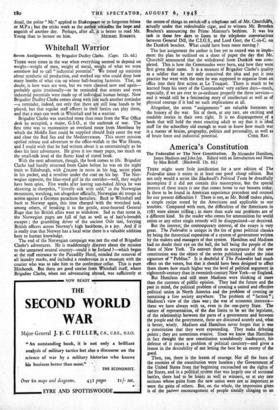Whitehall Warrior
Seven Assignments. By Brigadier Dudley Clarke. (Cape. 12s. 6d.) THERE were times in the war when everything seemed to depend on weight—weight of men, weight of metal, weight of what we were somehow led to call " industrial potential." We totted up statistics about synthetic oil production, and worked out who could drop how many bombs of what size op whose ball-bearing factories. That, no doubt, is how wars are won, but we were cheered now and again— probably quite irrationally—to be reminded that armies and even industrial potentials were made up of individual human beings. Now Brigadier Dudley Clarke comes along with just such another reminder —a reminder, indeed, not only that there are still lone hands to be played, but that regular staff officers in their forties can play them, and that a man can work in Whitehall and be a warrior.
Brigadier Clarke was snatched more than once from the War Office desk he occupied, a major, G.S.O., at the outbreak of war. The first time was to reconnoitre an overland route from Mombasa by which the Middle East could be supplied should Italy enter the war and close the Red Sea and the Mediterranean. This secret mission spelled release and adventure to the office-wallah in the War House, and I could wish that he had written about it as entertainingly as he does his later adventures. He gives it too many pages, too much on the small-talk level of the flatter kind of travel book.
With the next adventure, though, the book comes to life. Brigadier Clarke had hardly returned from Cairo before he was on the night train to Edinburgh, with Lio,000 in notes in his bag, secret plans in his pocket, and a revolver under the coat on his lap. The Nor- wegian opposite, the blue-eyed girl in the corridor—well, they might have been spies. Five weeks after leaving sun-baked Africa he was shivering in sheepskin, " literally sick with cold," in the Norwegian mountains, watching, not altogether officially, Norwegian ski troops in action against a German parachute battalion. Back to Whitehall and back to Norway again, this time charged with the wretched task, among others, of breaking it to the gentle, stout-hearted General' Ruge that his British allies were to withdraw. Sad as that scene is, the Norwegian pages are full of fun as well as of hair's-breadth escapes ; the grumbling driver of the ancient Oslo taxi, ferrying British officers across Norway's high backbone, is a joy. And if it is really true that Norway has a local wine there is a valuable addition here to human knowledge.
The end of the Norwegian campaign was not the end of Brigadier Clarke's adventures. He is maddeningly discreet about the mission to the unnamed neutral country—could it be Ireland ?—which began at the staff entrance to the Piccadilly Hotel, entailed the removal of all laundry marks, and included a rendezvous in a museum with the courier who was to take him to the conference cellar. This is pure Hitchcock. But there are good stories from Whitehall itself, where Brigadier Clarke, when not adventuring abroad, was sufficiently at the centre of things to switch off a telephone call of Mr. Churchill's, actually under that redoubtable cigar, and to witness Mr. Brendan Bracken's announcing the Prime Minister's bedtime. It was his task in those few days to listen to the telephone conversations between General Dill, the C.I.G.S., and Lord Gort, the C.-in-C. on the Dunkirk beaches. What could have been more moving ?
The last assignment the author is free yet to record was to imple- ment the plan he outlined on a sheet of paper the day that Mr. Churchill announced that the withdrawal from Dunkirk was com- pleted. This is how the Commandos were born, and how they were first given their name. It is a measure of Brigadier Clarke's quality as a soldier that he not only conceived the idea and put it into practice but went with the men he was supposed to organise from an office into their first action at Le Touquet. There is much to be learned from his story of the Commandos' very earliest days—much, especially, if we are ever to co-ordinate properly the three services— and it would still be a fascinating story of intellectual as well as of physical courage if it had no such implications at all.
Altogether, the seven " assignments " are valuable footnotes to the history of the war. Six of them, at any rate, are exciting and readable stories in their own right. It is no disparagement of a book that will hold the most exacting adult to say that it is ideal stuff for the schoolboy old enough to want to know how much war is a matter of brains, geography, politics and personality, as well as
of brute force and industrial potential. CYRIL RAY.


































 Previous page
Previous page